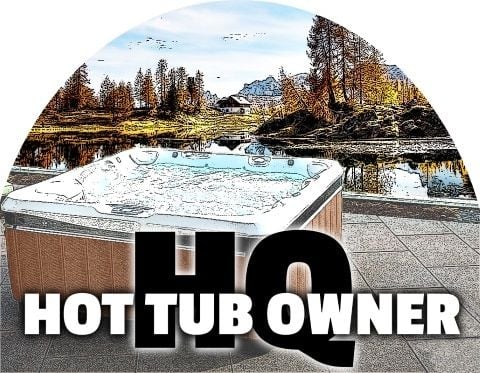I love hot tubs and we’ve owned 3 of them. But in addition to wanting to keep our kids safe, we’ve also wondered legally, do you need to put a fence around a hot tub?
The laws vary, but, you do need a fence around any outdoor hot tub or pool. There are state laws, city codes, and both CDC guidelines & the Virginia Graeme Baker Pool & Spa Safety Act on the Federal level that spells out exactly what is needed from a safety & barrier standpoint for both hot tubs & pools.
But there’s a lot more to know about hot tubs, spas, and even swimming pools with regards to legal requirements. So today, we’re diving deep into the world of hot tubs and code and legal requirements.
We’ll examine whether it makes a difference if you have an above-ground or built-in hot tub. But we’ll also look at variations like a swim spa. Ultimately, we’ll fully cover the question of whether you need a fence around your hot tub.
Let’s get going!

Looking to get a quote on a new hot tub?
Save time and receive multiple quotes for hot tubs from all the best-known brands!
I have arranged with BuyerZone.com to provide free quotes from all the best hot tub manufacturers – with no obligation to buy. Simply complete BuyerZone’s request form below.
Do you have to have a fence around a spa?
Yes. A barrier is required around a spa to prevent unsupervised persons, specifically children, from gaining access and possibly being injured or drowning.
Since the laws vary from country to country, state to state, and even within municipalities, there isn’t one answer that fits all.
That being said, in many cases, swimming pools, spas, or hot tubs are often required to have a barrier if it’s deeper than 300mm (about 1 foot) deep.
The reasons, of course, are to ensure that no one is using the spa unsupervised and could possibly drown. Now, of course, people can climb fences. But from a legal standpoint, if someone neighborhood kids hopped your fence to party in your hot tub and someone accidentally drowned, it certainly helps limit your liability.
So from a liability standpoint, make sure whoever installs your hot tub is licensed to do so. Also, make sure they get any necessary permits and follow all code restrictions for installing and fencing your hot tub or spa.
In this day and age, anyone can sue anyone for pretty much any reason.
But if you and your contractors followed all the laws to the letter, and someone who was trespassing got injured or died on your property, it can go a long way in your favor if all your I’s are dotted and all your T’s are crossed.
In some cases, local codes may allow locking hot tub covers instead of requiring a fence. Other states have restrictions regarding how far away from the house and a property line a hot tub is allowed to sit.
So always check with your local building planning office.
But when in doubt, your liability and the safety of others, is much better off WITH a fence than without one. And in the total cost of adding a hot tub, a small fence is a fairly small price to pay for that.
VIDEO: Bear breaks down fence, takes a swim in pool, hot tub #Local4 http://t.co/cXCKKXupul pic.twitter.com/R7ixkU6HkX
— Local 4 WDIV Detroit (@Local4News) August 20, 2015
Are the fence laws the same for inground vs above ground hot tubs?
In short, yes.
The obvious exception would be an inflatable hot tub which would generally be seen as portable and temporary. But since laws vary so much from place to place, it doesn’t hurt to check your area.
In general, above-ground or built-in hot tubs are seen about the same as in-ground or above-ground pools. And again, with pools, anything portable or temporary (or less than 1′ deep) would typically not be subject to the same rules.
Every year hundreds of (usually kids) people drown in pools and hot tubs, although pools are far more common. 67% of those deaths are kids from ages 1-3, so most likely unsupervised toddlers falling into a pool and not being able to swim. That’s according to the US Consumer Products Safety Comission.
And yes, inflatable or portable pools and hot tubs still accounted for 10% of the deaths.
I still recall a former co-worker of mine at Whole Foods who suffered the terrible tragedy of his daughter babysitting the child of his best friend. And for a split second, his daughter turned her attention away from the young child, and the child drowned in their pool.
So while we are focused heavily on laws in this article, and your liability, never forget that what we’re really talking about is child safety and saving lives.
Three projects almost complete at Patriot HQ. A new roof over the Hot tub, a new fence and a new deck with Gazebo. That’s me in line for a special cuddle, and it’s not even my birthday. ☺️🤞🏻 pic.twitter.com/hw8ZnmAel6
— Yorkshire Patriot 🎚 (@Para_glider69) May 24, 2020
Do spa pools have to be fenced?
A spa pool is just the official name for an in-ground hot tub.
Technically the name hot tub is for above-ground hot tubs. But these days, “hot tub” has pretty much become the common term for both.
A spa pool, while definitely in-ground, can either be separate from a pool or attached. The vast majority of them tend to be attached to a nearby pool. And they can be indoor (more common at hotels) or outdoor.
And yes, whether it’s near a pool (which almost assuredly requires a fence) or not, in most municipalities, it will still need a fence.
Really nice Hot Tub with great wood fencing and steps around it. pic.twitter.com/I1GLltvb
— Dan, PoolAndSpa.com (@PoolAndSpaMoose) August 9, 2012
Is a fence required for a Swim Spa?
Yes is the short answer.
A swim spa sort of takes the best parts of a swimming pool and a hot tub and puts them together.
So if you’d love a pool but don’t have any extra $40,000 laying around or like the idea of a hot tub, but wish it was bigger, this might be exactly right for you.
Typically a swim spa will be between 14′ to 18′ long, so much longer (but not necessarily wider) than a hot tub.
Like a hot tub, they feature an acrylic shell and can heat up, but some models are fiberglass. They also feature a circulation feature that allows you to swim in place without ever hitting the far side of the swim spa.
Essentially it pushes water towards you from one end as you swim, simulating the ability to swim a long distance in a relatively small body of water.
Many times, swim spas are indoors, but they can be outdoors too. Like a hot tub, they can also be in-ground or above ground.
As you might expect, a swim spa is not going to be treated any differently than a hot tub or pool in terms of how your city, state, or county regulates it. So always check with your building planning department. But in most cases, you will definitely want to fence it if it’s outdoor.
Glass fencing isn’t just for pools! We designed this custom glass hot tub fence for a client in Newport Beach, CA https://t.co/kM1kJiK8KB pic.twitter.com/YTgL0A3mTX
— Aquaview Fencing (@AquaviewFencing) August 14, 2017
Do hot tub fence laws vary by state?
Yes is the short answer.
On a federal level, the CDC has a voluntary Model Aquatic Health Code (MAHC) which is what they suggest local and state authorities follow. But, of course, many states and local municipalities do things their own way.
In addition, there’s also the VIRGINIA GRAEME BAKER POOL AND SPA SAFETY ACT. This act regulates how states set laws pertaining to barriers around pools and hot tubs.
The act requires “the enclosure of all outdoor residential pools and spas by barriers to entry that will effectively prevent small children from gaining unsupervised and unfettered access to the pool or spa”
The CDC guidelines list some of the following as criteria:
- Fences, gates, doors, and safety covers should be used to prevent access to water
- Barriers do not have nearby furniture to encourage climbing
- Gates, self-latching locks, and other locks are tested to function properly
- Barriers should be used between chemical storage and mechanical areas
- Minimum of 42″ high
But for your individual state and city codes, you’ll need to check to make sure. Luckily, I’ve compiled all the links by state in the section below.
Nothing better than sitting back in the hot tub and admiring a lovely deck supplied and installed by Knight Fencing pic.twitter.com/TxjCwEttjC
— Knight Fencing (@KnightFencingUK) March 24, 2015
Hot tub fencing requirements by state
Here are links to the codes by state. Where you don’t see a link (Alabama & Kansas) that means there is not a specific state regulation.
Final Thoughts
In this article, we took a look at the world of hot tub and spas and fencing requirements.
Every year, hundreds of kids drown in hot tubs and swimming pools. While that number is much lower for accidental hot tub drownings (under 10), it’s still a danger. Legally speaking, we have to check organizations like the ICC (International Code Council) which lays out code restrictions for building codes (including pools and hot tubs).
But it’s also possible for states, cities, and counties to have individual restrictions too. Ultimately though, if you’re adding a hot tub (or a pool), while it’s important to be legal, the primary concern here is the safety of children and everyone using it.
So whether you need a fence around a hot tub from a legal point of view, plan on adding one to ensure that no one is using it without your permission and supervision.
Confused about hot tub chemicals?
I break down the best chemicals to use, which ones you don’t need, and which chemicals are best for sensitive skin in a recent article.
I walk you through step-by-step what to buy, which brands are best, and how to test and apply them to your water for the best results. What really surprised me was how much chemical products you can save by treating your water correctly. Sometimes less really is more!
Just click the link to read it on my site.
- Relxtime 6 Person Square Inflatable Hot Tub (2024 Review) - March 11, 2024
- Hot Tub Cover Mold – Complete Cleaning Guide - February 20, 2024
- Hot Tub Heater Longevity: How Often Should You Replace? - December 14, 2023

